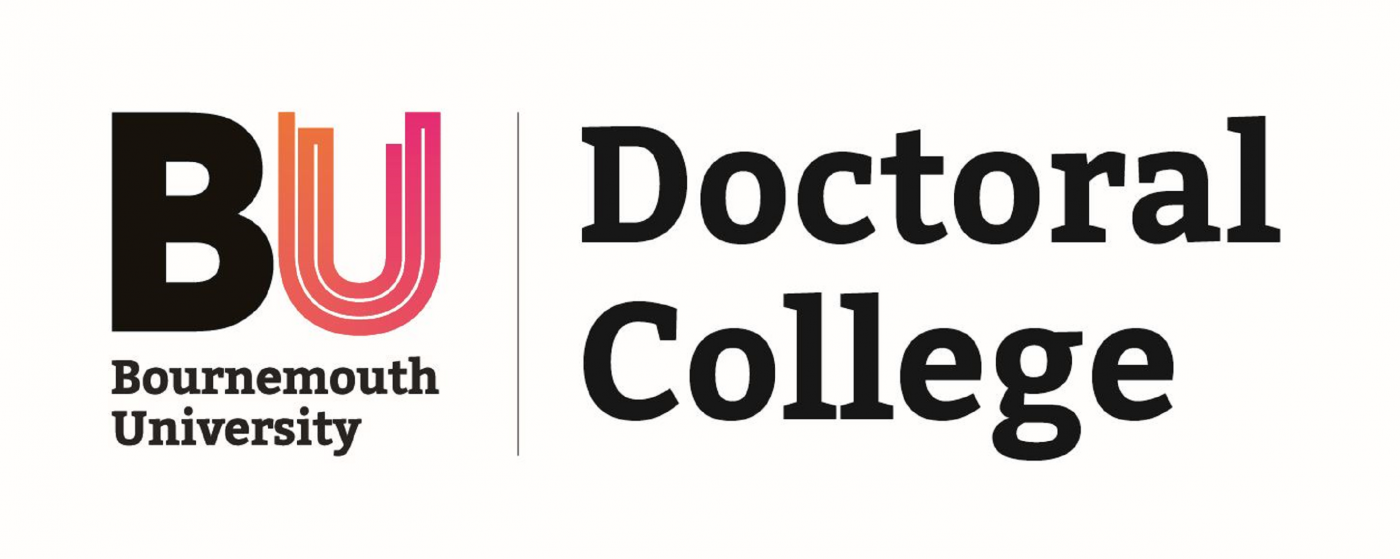
On Wednesday 7 March 2018 the Doctoral College hosted the 10th Annual Postgraduate Research Conference which brought together and recognised the excellence of BU’s postgraduate research.
Meet this year’s winners:
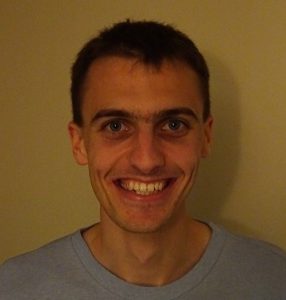 |
Mark Stevens, Faculty of Management
Research topic: A social identity approach to understanding physical activity. Why I chose this research topic: As a regular runner, and someone who engages in a lot of physical activity myself, I am a strong believer that being active should be a priority for us all. Having also seen first hand the issues being inactive can cause, and being aware of the scale of the inactivity crisis we are facing on a global scale, I am passionate about understanding the factors that influence people’s physical activity levels and devising effective ways of getting—and keeping—people more active. Example of how research at BU has changed things for me: My PhD has given me the opportunity to learn a wide variety of new skills and develop my existing skills in several areas. For example, working closely with my supervisors, collaborating with researchers around the world, and working to publish journal articles has helped me learn several advanced methods of statistical analysis and develop my academic writing. Quick quote: Following on the physical activity theme, but also a good thought about working hard: “Nobody ever drowned in their own sweat!” |
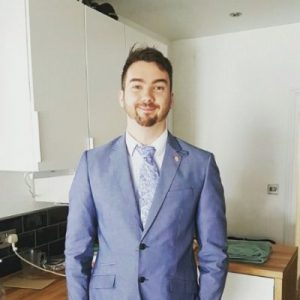 |
Stephen Allard, Faculty of Media & Communication
Research topic: When does Page become Stage: Exploring Evolving Poetic Practices in Digital Spaces. Why I chose this topic: The growth and popularity of social media sites, especially within the last decade, has arguably forever changed the way that we imagine, interact with, and relate to, each other. With increasing cynicism towards these new social worlds of words, with terms such as ‘fake news’ ingrained in the public consciousness, I am fascinated by how poets might add their voices to these new social frontiers. If a search for truth about online interaction is currently only revealing something increasingly seen as fake, then can perhaps poets, using something fictional, reveal new truths about ourselves, and each other, online? Example of how research at BU has changed things for me: Bournemouth University has a rich, diverse, and interactive postgraduate research community, that actually feels like a community. Through events, workshops, and talks, I have gained the opportunity to work with a range of talented and passionate researchers, working across many fields and in many disciplines. This has not only pushed the boundaries and possibilities of my own research, but also opened up new opportunities, and completely new ways of thinking about the postgraduate experience. Quick quote: Oscar Wilde: ‘Everything in moderation, including moderation’ |
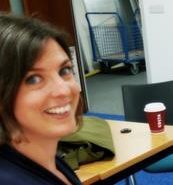 |
Louise Oliver, Faculty of Health & Social Sciences
Research topic: Family Narratives of Child-to-Parent Violence and Abuse: Lifting the Veil of Secrecy Why I chose this topic: I have worked within Children’s Social Care for over a decade, with a focus on working with family violence and abuse. As part of my practice, it became apparent that there was a dearth of research about children who are controlling, aggressive and/or violent towards their parents, as well as limited targeted support for families experiencing child-to-parent violence and abuse. This motivated me to study this form of family violence and abuse in order to further prevent, intervene and support families experiencing this. Example of how research at BU has changed things for me: This research has helped in many ways, it has helped develop my practice by improving my theoretical understanding of family violence and abuse, and I have been able to incorporate this within my practice. I am also in a position that I am able to offer advice and guidance to my colleagues. Quick quote: “…a moment of silence, a question without answer, provokes a breach without reconciliation where the world is forced to question itself” (Foucault 1967) |
| Amal Musa Almoualed, Faculty of Media & Communication
Research topic: Saudi Women Journalists—An Exploration of Their Role and Practice in an Age of National Transformation Why I chose this topic: The advancement, development and empowerment of women is a lifelong interest of mine, something I wish to study and achieve in my personal and professional life. This motivated me to approach my research from both sides—‘journalism’ and ‘women’—in order to combine my joint passions for journalism research and the advancement of women. Example of how research at BU has changed things for me: Being a researcher in Women and Journalism at Bournemouth University has developed my personal and professional skills and exposed me to other cultures. This has helped broaden my horizons and also helps me communicate more effectively with professionals and colleagues from different cultures. Quick quote: These are two of my own quotes, which I always recall whenever I need to encourage myself to continue pursuing my dreams: ‘Being a woman means to have patience, determination, enthusiasm and confidence as you challenge any barriers that limit your success in your personal and professional life.’ ‘Some women seek to be pretty and work hard to remain pretty their entire life; however, I believe my prettiness is determined by being mindful, ambitious, and successful in achieving my goals.’ |
|
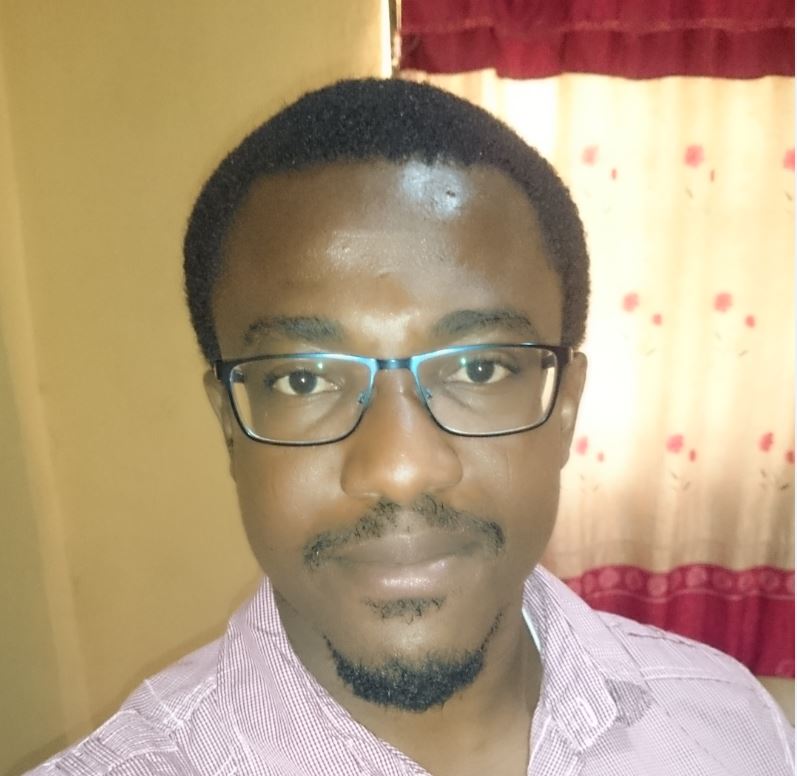 |
Ejike T. Ezeh, Faculty of Health & Social Sciences
Research topic: Shared decision-making: investigating the potential of an interactive, web-based information tool to support treatment choice of people with advanced pancreatic cancer Why I chose this topic: I have always been interested in the impact of information technology in healthcare, and when the opportunity became available, I applied and was selected. Also, being able to help people in making important decisions about their health is a rewarding experience for me. Example of how research at BU has changed things for me: Research has taught me that you have to be very thorough and systematic even in the most basic things in life. Someone may build on your work in the future. I am more careful in my utterances as well. There must be sufficient evidence to support them. Quick quote: When the going gets extremely tough, then you are close to a breakthrough. |
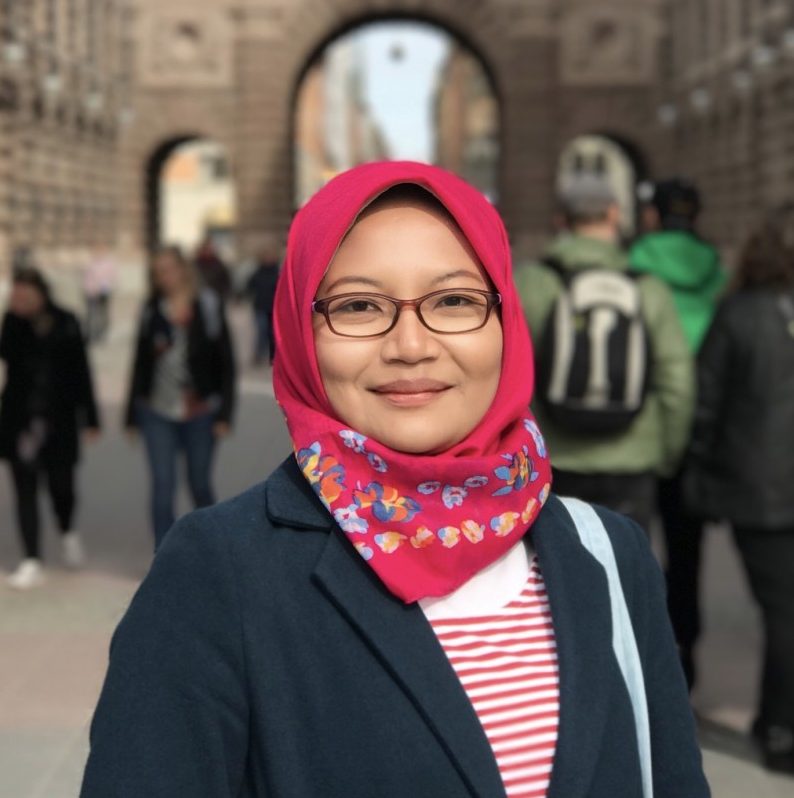 |
Nurist Surayya Ulfa, Faculty of Media & Communication
Research topic: I am undertaking a PhD on ‘the digital virtual consumption practices and commercial enculturation among Indonesian Muslim girls’. In particular, the work aims to account for how Indonesian Muslim girls’ engagement with DVC in Girls games shapes both their literacy of and desire for Western consumer culture and the role of Islam in the process. By doing this, enables me to shed light on the interplay between market and religion under the consumer culture theory traditions. Why I chose this topic: Since 2009, as an academia in Diponegoro University Indonesia, I have been interested in studying children and marketing communication themes in Indonesia. My PhD problematization derived from my previous finding on Muslim children engagements with local and global media practices. Example of how research at BU has changed things for me: Undertaking PhD in Bournemouth University is a journey that I have thoroughly enjoyed so far. The reliable and supportive supervisory team is obviously the best part of my PhD journey. By way of their guidance, I have learned a lot about my research area and had valuable opportunities to develop myself. |
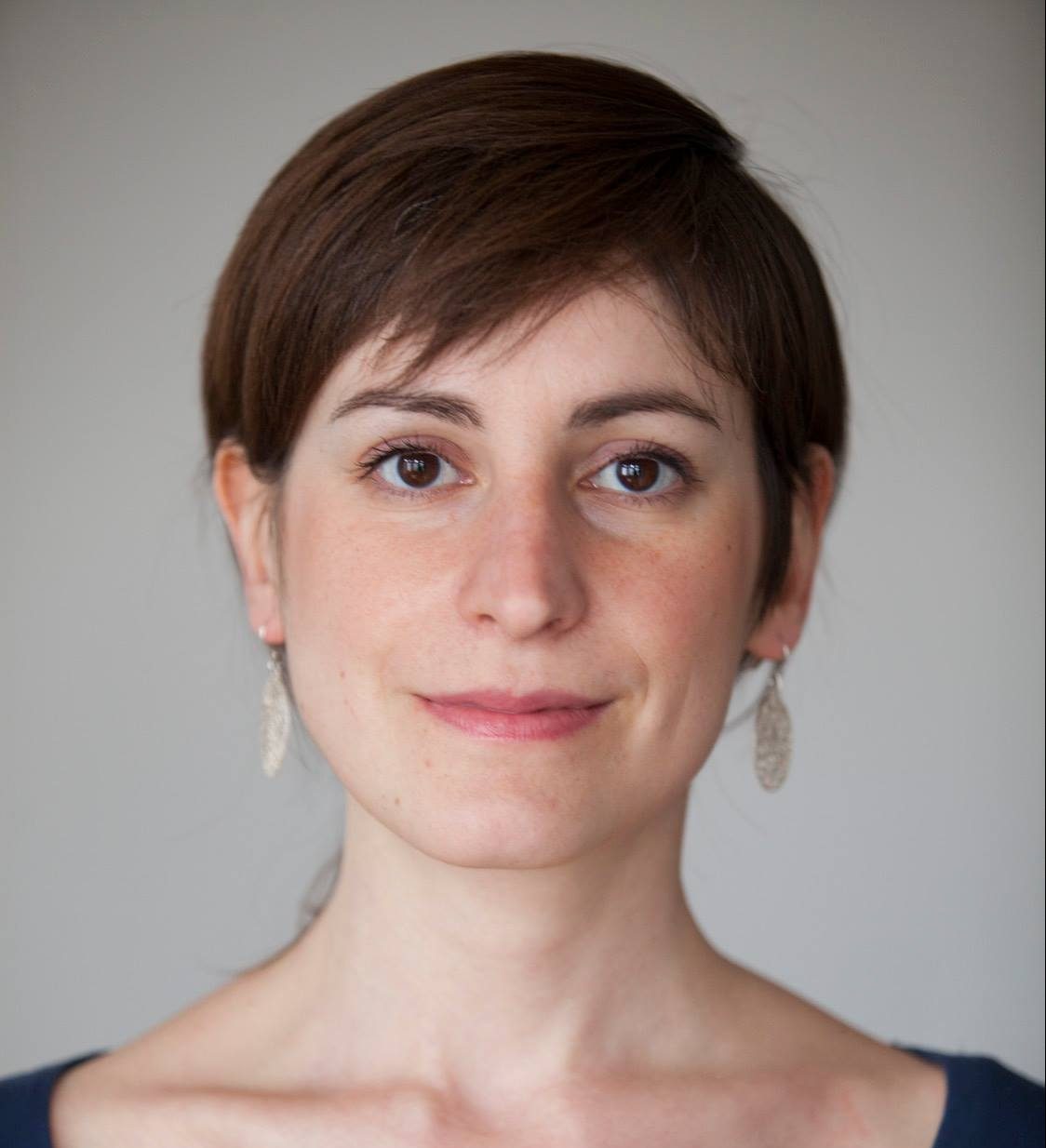 |
Giulia Levi, Faculty of Health & Social Sciences
Research topic: Between silence and agitation. Coping strategies and third-party interventions in divided societies: a comparison between post-conflict Bosnia and post-referendum UK. Why I chose this topic: The Brexit referendum has favoured the emergence of new lines of division in the British society. After years working in civil society organisations operating in divided contexts I have seen how initiatives to bridge societal divisions often apply standardised models overlooking the specificities of the contexts and of the people they work with. My project looks at how such initiatives are experienced by beneficiaries in order to develop a more socio-culturally sensitive approach. Example of how research at BU has changed things for me: Since I started my PhD I’ve had the chance to participate in workshops and conferences, meeting researchers I could discuss my ideas with. As part of my research I am exploring the cultural diversity of Dorset collaborating with civil society organizations on the ground that work on hate crime prevention and victims’ support. Quick quote: ‘Every culture is always on a nomadic path’ (M. Engelke) |
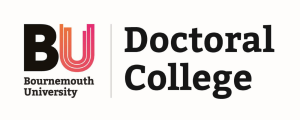



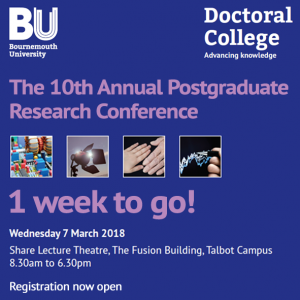 The Doctoral College kindly invites you to attend the 10th Annual Postgraduate Research Conference taking place in the Fusion Building, Talbot Campus.
The Doctoral College kindly invites you to attend the 10th Annual Postgraduate Research Conference taking place in the Fusion Building, Talbot Campus.

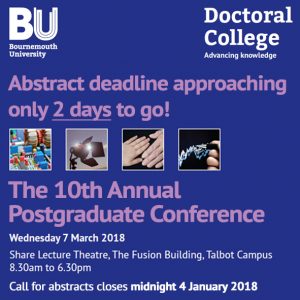
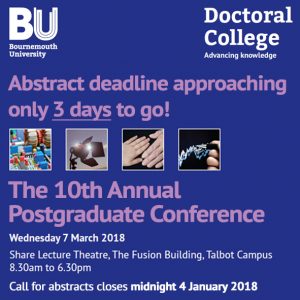
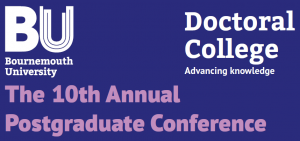











 SPROUT: From Sustainable Research to Sustainable Research Lives
SPROUT: From Sustainable Research to Sustainable Research Lives BRIAN upgrade and new look
BRIAN upgrade and new look Seeing the fruits of your labour in Bangladesh
Seeing the fruits of your labour in Bangladesh Exploring Embodied Research: Body Map Storytelling Workshop & Research Seminar
Exploring Embodied Research: Body Map Storytelling Workshop & Research Seminar Marking a Milestone: The Swash Channel Wreck Book Launch
Marking a Milestone: The Swash Channel Wreck Book Launch ECR Funding Open Call: Research Culture & Community Grant – Application Deadline Friday 12 December
ECR Funding Open Call: Research Culture & Community Grant – Application Deadline Friday 12 December MSCA Postdoctoral Fellowships 2025 Call
MSCA Postdoctoral Fellowships 2025 Call ERC Advanced Grant 2025 Webinar
ERC Advanced Grant 2025 Webinar Update on UKRO services
Update on UKRO services European research project exploring use of ‘virtual twins’ to better manage metabolic associated fatty liver disease
European research project exploring use of ‘virtual twins’ to better manage metabolic associated fatty liver disease